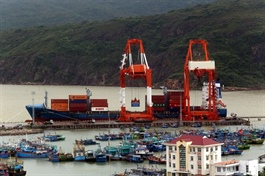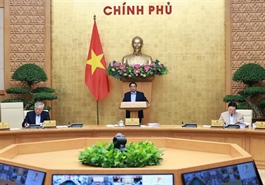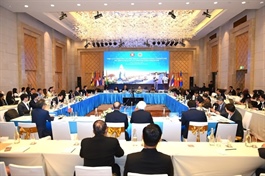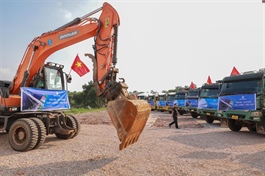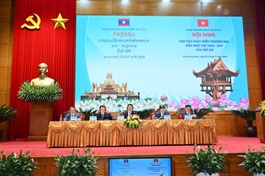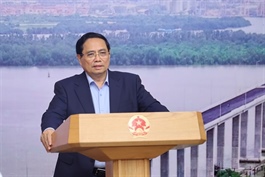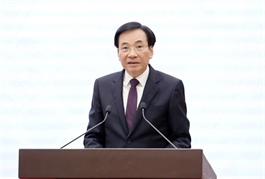Businesses partner with government for the green-digital transition
Businesses partner with government for the green-digital transition
The Vietnam Business Forum (VBF) 2025 on November 10 saw the public and private sectors converge to define the country’s development trajectory amid the twin transition of green growth and digitalisation.
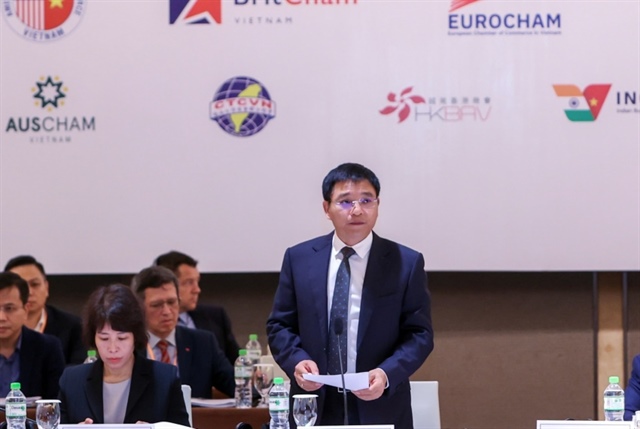
Minister of Finance Nguyen Van Thang |
At the opening of the VBF, Minister of Finance Nguyen Van Thang said that 2025 carries special significance as Vietnam mobilises all resources to accelerate and fulfill the nation's goals at the highest level.
"[Current foreign investment] figures affirm international investors’ confidence in Vietnam’s prospects and reflect growing domestic dynamism, fuelled by ongoing policy reforms," Minister Thang said. "Local authorities have begun to shift from administrative management to a mindset of development facilitation and service to citizens and businesses."
In parallel, Vietnam is advancing a comprehensive policy ecosystem, anchored by seven strategic resolutions covering science and technology, international integration, private sector development, education, health, law enforcement, and institutional reform.
"Together, they create a golden opportunity for the business community and set the stage for sustained double-digit growth and the outlined long-term strategic visions," he added.
Reflecting this vision, the VBF has evolved into a symbol of deepening public-private collaboration.
Ho Sy Hung, chairman of the Vietnam Chamber of Commerce and Industry (VCCI) and co-chair of the VBF Consortium said, “The VBF is is a forum of commitment, where domestic and international businesses partner with the government to tackle the nation’s biggest challenges.”
He emphasised that the business community, both domestic enterprises and foreign investors, share a trusted partnership role, bringing capital, technology, and global expertise to jointly realise the twin goals of green and digital transformation.
This collaboration is reflected in four major groups of recommendations submitted to the government by VBF: institutional breakthroughs in building a stable, transparent, and predictable legal framework; mechanisms for green transition by removing financial and regulatory barriers to large-scale energy projects and accelerate the development of green finance; strengthening data governance, cybersecurity, and addressing the urgent digital talent gap; and unlocking private capital by fast-tracking stock market upgrades and diversifying financial instruments to fund infrastructure and production.
"These proposals not only represent the voice of the business community but also serve as policy insights that could help the government shape new growth drivers in a volatile global landscape," Hung said.
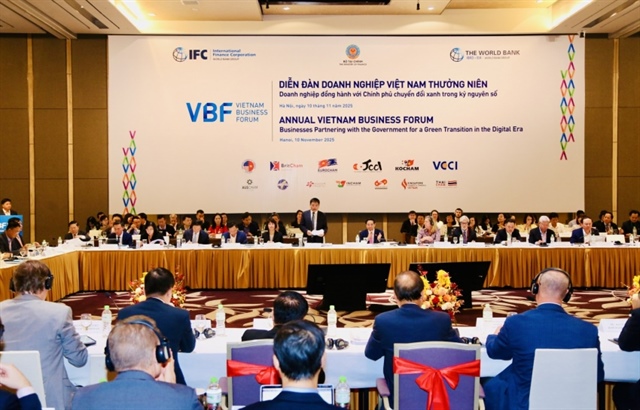
Ho Sy Hung, VCCI chairman |
Greening growth and soft Infrastructure
From a policy perspective, Minister Thang noted that three cornerstone frameworks - the National Green Growth Strategy, National Action Plan on Green Growth, and Circular Economy Development Scheme - now form the pillars of Vietnam’s economic restructuring agenda, guiding a shift towards high-quality, efficient, and sustainable growth.
“With our strategic geopolitical and economic position, Vietnam stands before a historic opportunity to catch up, move in tandem, and even leap ahead,” he said.
Indeed, many Vietnamese firms have begun to green their operations, embracing innovation, investing in clean energy, using eco-friendly materials, and integrating environmental, social, and governance standards as a global competitiveness requirement.
Foreign-invested enterprises are also driving this transformation, as global supply chains increasingly demand carbon transparency and sustainability reporting.
If green transformation is a necessity, digital transformation is the accelerator. Hung of the VCCI called them “two inseparable pillars”.
"The digital era requires technological investment, soft infrastructure, a flexible regulatory environment, and a digitally skilled workforce. Implementing resolutions on digital transformation and on education/digital skills is therefore critical for Vietnam to avoid a looming human capital bottleneck."
Without decisive action to build digital capabilities, Vietnam risks missing out on opportunities in AI, cloud computing, and the data economy, Hung added. Simplifying e-commerce procedures, standardising data regulations, and enhancing cybersecurity are also essential to empower private enterprises to thrive in the global digital ecosystem.
|
A standout theme of VBF 2025 is its balanced view of domestic and foreign enterprises as dual drivers of Vietnam’s growth. "Foreign-led groups bring in large-scale capital, advanced technology, and global standards. Vietnamese enterprises provide the absorptive capacity, supply chain connectivity, and sustainability diffusion needed for inclusive development," he explained.
With participation from both the VCCI and international business associations, the VBF Consortium pledges to act as a bridge, resolving policy issues and fostering deeper links between these two sectors. This synergy will allow Vietnam to integrate more deeply into global value chains, moving from low-value assembly to high-value production and innovation.
“The business community stands ready to accompany, share responsibility, and work with the government to build a green, digital, and prosperous Vietnam,” Hung stated.
- 19:22 10/11/2025








